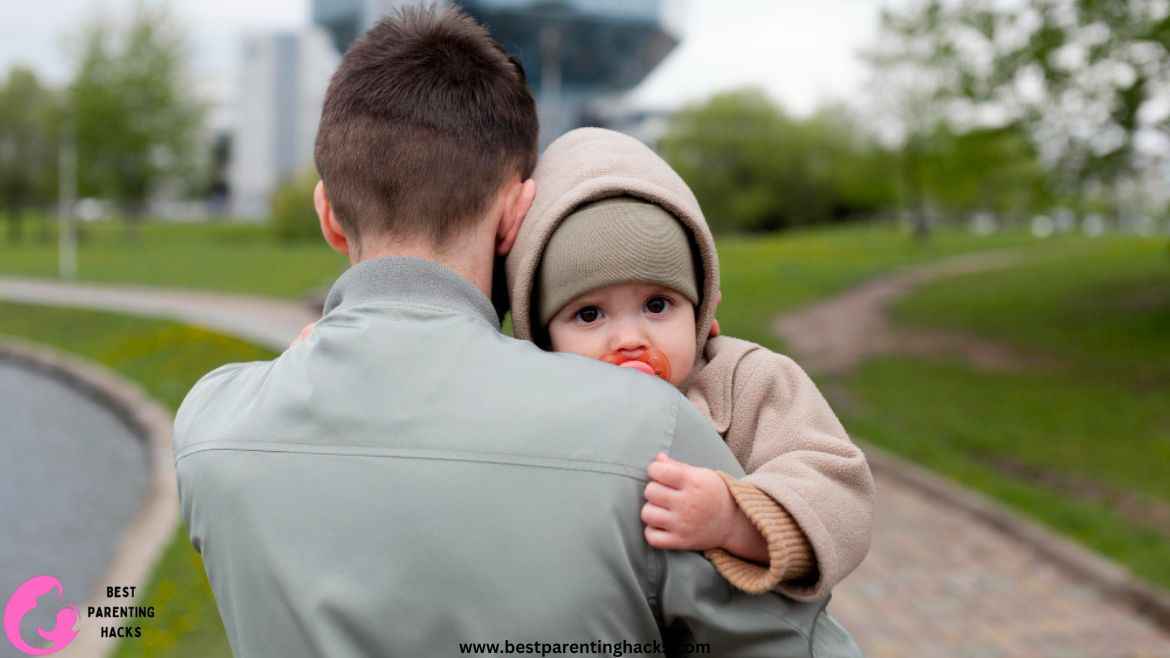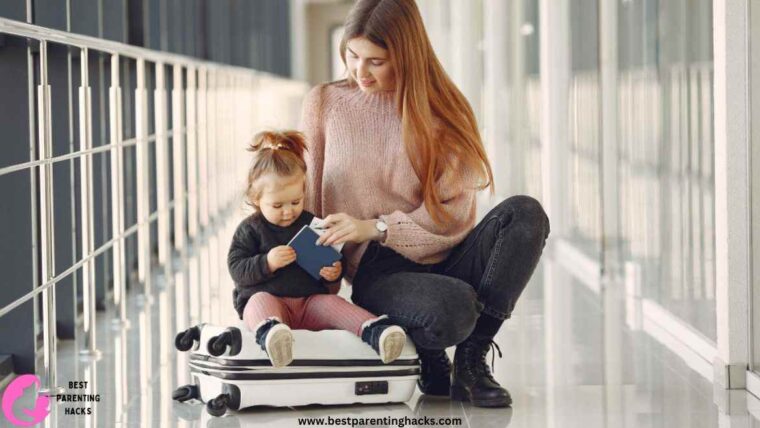Table of Contents
I was faced with the intimidating issue, “Will my baby forget me if I leave for a month?” as a parent who just had to leave my 6-month-old child for a month-long business trip. This question struck a deep chord with me. Evoked a range of emotions and concerns. I want to talk about my path, abandoning anxiousness, and getting advice from other people in the first paragraph. Based on both firsthand knowledge and academic study, the second paragraph will offer a lucid and comforting response to the query.
From an early age, babies have remarkable abilities in learning and memory development. Compared to adults, their memory development is very different, emphasizing routine and familiarity over explicit recollection. Parents must understand these developmental stages, especially during periods of absence.
1. Early Memory Formation: Babies begin to learn from their surroundings as soon as they are born. This includes the ability to recognize voices, faces, and even smells—particularly those of their primary caregivers. Instead of creating distinct memories, the purpose of this early memory is more about creating a feeling of comfort and familiarity.
2. Implicit vs. Explicit Memory: The subconscious recall of abilities and routines is known as “implicit memory,” which is first developed in babies. They can recognize their parents’ voices and faces thanks to this kind of recall. Explicit memory develops later, often by the time a child is two years old. Explicit memory is the conscious recall of certain experiences.
3. Developmental Milestones: Babies start to recognize their caretakers at the age of six months. This developmental stage is important for memory formation because it shows that stronger, more focused attachments and memories are beginning to emerge.
4. Memory Consolidation: As infants become older, their memory and recall are stronger. Their surroundings, past experiences, and the emotional connection kids have with their caregivers all play a role in this memory consolidation process. It’s a slow process that changes as the infant’s brain grows.
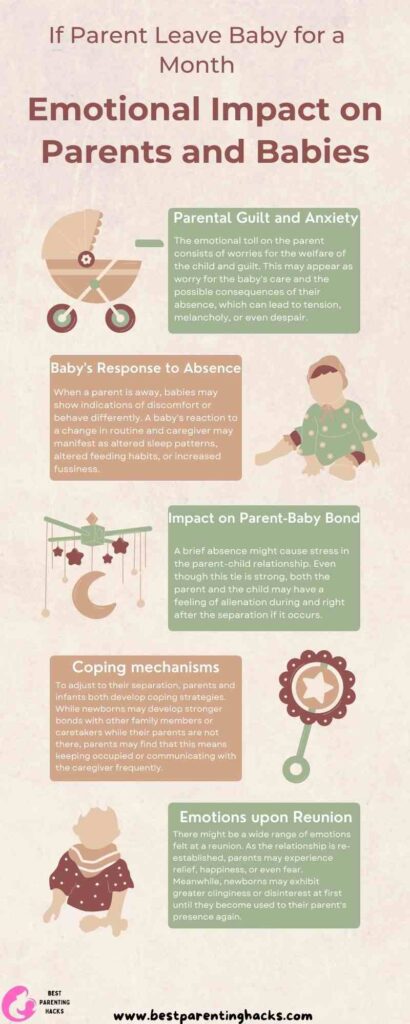
Emotional Impact on Parents and Babies
A parent who leaves their child alone for a long time will have deep and complex emotional consequences that will affect both the parent and the youngster. When their primary caregiver is not there, newborns may show behavioral changes, and parents frequently struggle with emotions of guilt and fear. To manage the separation healthily, it is vital to comprehend these emotional reactions and the underlying causes of them.
1. Parental Guilt and Anxiety: The emotional toll on the parent consists of worries for the welfare of the child and guilt. This may appear as worry for the baby’s care and the possible consequences of their absence, which can lead to tension, melancholy, or even despair.
2. Baby’s Response to Absence: When a parent is away, babies may show indications of discomfort or behave differently. A baby’s reaction to a change in routine and caregiver may manifest as altered sleep patterns, altered feeding habits, or increased fussiness.
3. Impact on Parent-Baby Bond: A brief absence might cause stress in the parent-child relationship. Even though this tie is strong, both the parent and the child may have a feeling of alienation during and right after the separation if it occurs.
4. Coping mechanisms: To adjust to their separation, parents and infants both develop coping strategies. While newborns may develop stronger bonds with other family members or caretakers while their parents are not there, parents may find that this means keeping occupied or communicating with the caregiver frequently.
5. Emotions upon Reunion: There might be a wide range of emotions felt at a reunion. As the relationship is re-established, parents may experience relief, happiness, or even fear. Meanwhile, newborns may exhibit greater clinginess or disinterest at first until they become used to their parent’s presence again.
You Might Also Like to Read: Baby’s Breath Smells Like Yogurt. What’s the Reason?
Strategies to Maintain Connection
You and your child need to stay in touch with your infant when you are away. It facilitates a more seamless reunion by lessening the emotional toll of separation. Tactics that are effective can have an impact on maintaining the bond between a parent and their child especially when they are physically separated.
1. Regular Communication: Keeping in touch may be greatly aided by the use of technology, such as video calls. Maintaining a visual and emotional connection through mutual vision and hearing reassures the infant and the parent.
2. Familiarity Objects: Leaving things that smell like their parents, like soiled clothing, will reassure the infant. These items help to preserve a feeling of intimacy by acting as a recall of the parent.
3. Gradual Preparation: You may make the transition easier by exposing the infant to different caregivers gradually and by taking brief breaks from them. This method makes sure the infant feels comfortable and protected with their temporary caretakers while also assisting them in adjusting to their parent’s absence.
4. Maintaining Routine: It’s critical to maintain the baby’s routine as much as possible while the parent is away. A steady routine offers a sense of security and normalcy, which is particularly helpful in helping the baby adjust to the change.
5. Informing Caregivers: It’s critical to make sure that substitute caregivers are aware of the baby’s needs, preferences, and routines, including feeding schedules, sleep patterns, and comfort measures that can help the baby adjust to the separation.
You Might Also Like to Read: Why Does My Baby Make Fart Noises With Her Mouth?

Returning Home: Rebuilding the Bond
Reestablishing the link with your child after a lengthy separation is a difficult but important procedure. It requires detecting and responding to the baby’s wants and feelings, as well as resuming interrupted routines and relationships. For both the parent and the child, this stage is as much about reconnecting as it is about adapting.
1. Patience in Reconnection: It’s critical to exercise patience throughout the reunion as the infant may need some time to become used to their parents’ presence. Every child goes through a different readjustment phase, which calls for the parent to be sympathetic and understanding.
2. Quality Time Together: Strengthening the re-established connection requires spending quality time together and participating in bonding activities. Playing, snuggling, or just being there may all help parent and child get again acquainted with one another’s rhythms and routines.
3. Re-establishing Routines: Giving the infant a routine as soon as feasible can help them feel secure and normal. Reiterating daily routines including feeding, bathing, and bedtime rituals on a regular basis helps to deepen the bond and ease the transition.
4. Attentiveness to Baby’s Needs: During this stage, it’s important to pay attention to the baby and respond to their cues. By being aware of any changes in the baby’s needs or behavior following the separation, the parent is better able to respond to the child and make them feel safe and secure.
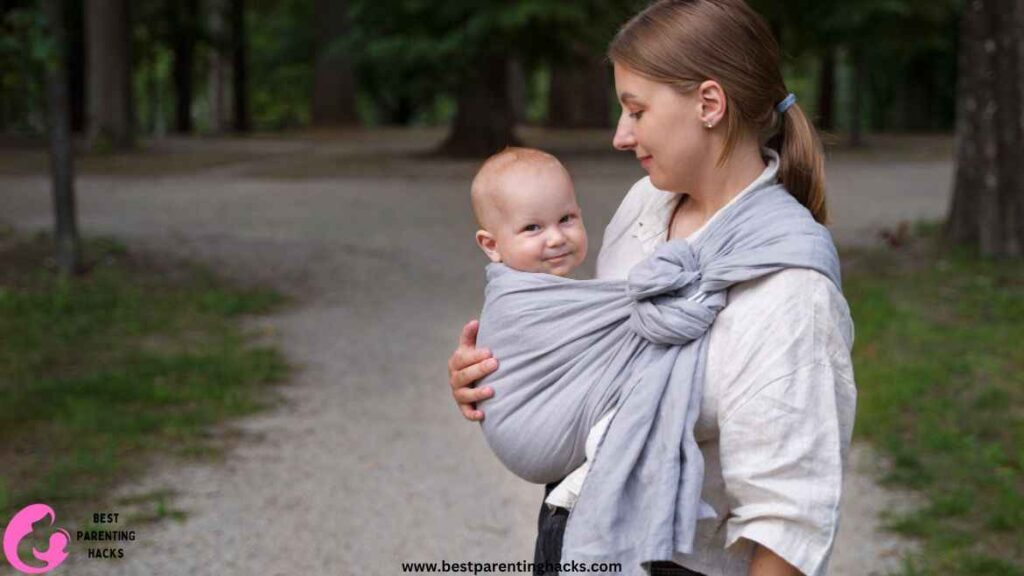
Expert Opinions and Studies
Expert views and empirical research provide insightful information about how parental absence affects infants and how to minimize any harmful consequences. These materials provide parents comfort and direction as they manage the difficulties of separation and reunion. Making decisions and preserving a close relationship with their child can be facilitated by parents having a thorough understanding of these expert opinions and study results.
1. Psychological Insights: Within the first few months of life, babies form secure attachments with their primary caregivers; these attachments are resilient and can withstand periods of separation, as long as the baby is well-cared for. It is important to maintain emotional connections and routines during the absence to support the baby’s emotional well-being.
2. Understanding Object Permanence: Research indicates that babies develop ‘object permanence’ around six months of age, understanding that things and people exist even when not seen. This development plays a crucial role in how babies remember and stay connected with absent parents.
3. Secure Attachments: Studies show that babies form secure attachments with their primary caregivers within the first few months of life.
4. Importance of Routine: It is emphasized that a baby’s routine must be consistent to assist them in adjusting to their parent’s absence. According to experts, keeping up with habits that the infant is accustomed to might provide them with a sense of comfort and stability.
5. Role of Alternative Caregivers: It is believed that an infant’s growth is enhanced, not hindered, by the presence of alternative caregivers. In addition to offering continuity of care, research indicates that developing strong relationships with other reliable people can support the baby’s social and emotional development.
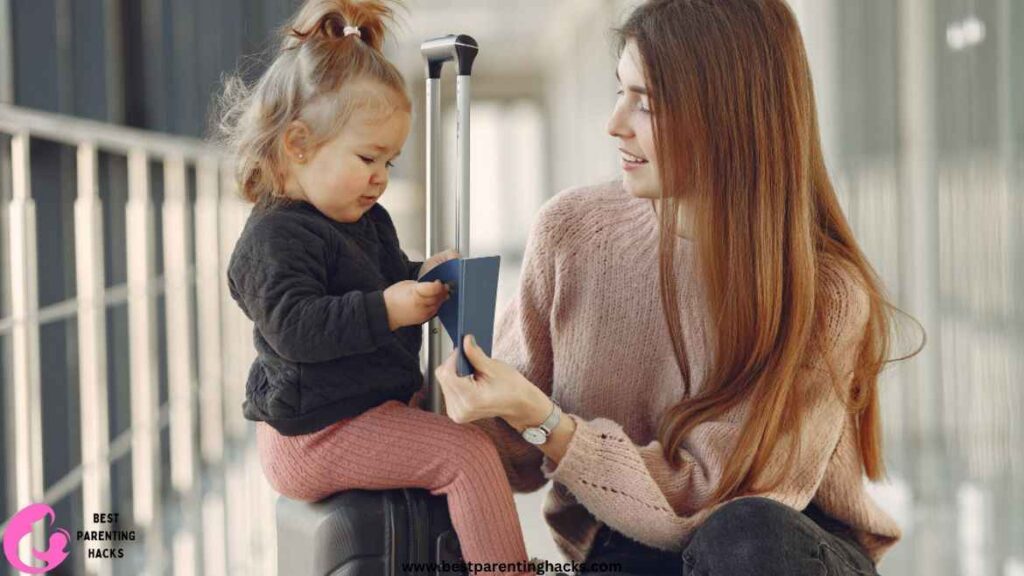
Personal Stories from Other Parents
Speaking with other parents who have successfully managed the difficulty of taking long trips without their infants gave me comfort and a variety of viewpoints on this widespread worry. A unifying theme across all the stories, despite their distinct emotional landscapes, was the ongoing power of the parent-child link, perseverance, and adaptation.
Sarah, a mother, shared her story of having to leave her 8-month-old daughter behind for a two-week work trip. Her account radiated the unease that comes with being apart. She explained how she progressively increased her daughter’s time spent with her grandma, who would be the primary caretaker, to prepare her for the absence. Sarah left behind a blanket that she frequently used when breastfeeding, and she utilized video chats to have a visual connection. When she finally arrived back home, she talked about how relieved and ecstatic she was to see her kid grin and giggle.
David, a different dad, related how he had to spend a month away from his one-year-old kid for medical treatment overseas. He discussed his conflicted feelings of remorse over leaving and the need to receive therapy. David highlighted how important it is to have frequent video conversations with his son and how he sends his wife taped bedtime tales to listen to. His kid hesitated a little at first but then gave him a loving hug that reassured him of their unwavering link. Their reunion was an emotional one.
Emily, a military mother who had to leave her six-month-old child for three months, shared a heartwarming experience. She talked about how difficult it was for her deployment circumstances to prevent everyday touch. Emily was very dependent on her lover to send her updates in the form of pictures and videos. Upon her return, her nine-month-old baby clung to her with recognition and love, causing tears and joy.
These tales, which emphasize various tactics and emotional reactions, demonstrate an enduring reality: a parent-child relationship is strong. They serve as a reminder that, although it is normal to worry about being forgotten, the truth is frequently far more encouraging. Parents seem to have a common experience of the happiness of reunion and the enduring strength of the link, which gives hope and comfort to people in similar circumstances.

Conclusion
When considering the experience of temporarily parting from a newborn, it is evident from a wealth of studies, professional opinions, and personal experiences that the relationship between a parent and their kid is strong and enduring. Even while the thought of being apart from your child might be frightening and cause guilt and worry, it’s crucial to keep in mind that these emotions are normal for parents. The techniques covered are essential for reducing the emotional toll that separation has on the parent and the kid. These include keeping lines of communication open and making sure the baby’s schedule is consistent.
The anecdotes from other parents are a potent illustration of how strong the bond between a parent and kid is. They show the difficulties as well as the great happiness and pleasure that come with being back together. These stories provide consolation and assurance by serving as a gentle reminder that our infants are flexible and that the relationships we have with them do not simply deteriorate over time or physical distance.
Finally, while many parents are forced to leave their children for an extended period of time, this does not suggest a lack of love or connection. Parents may successfully navigate this difficult experience by planning, being empathetic, and making use of the tools and solutions that are available to them. This will ensure that the reunion is as happy and loving as the link that kept it together during the separation.
FAQs
1. After a month, will my baby still remember me?
• Address how comfortable the infant feels with their primary caretakers in your response.
2. How do I get my child ready for my absence?
• A response outlining the baby’s gradual adjustment to the parent’s absence.
3. How can I tell whether my child is missing me?
• Describe the typical symptoms that indicate a baby is missing their parent.
4. How can I keep my kid and me connected while I’m away?
• Respond by talking about strategies for preserving emotional ties when apart.
5. How would my absence impact my child’s growth?
• A response discussing the effects of brief separation on a newborn’s growth.
6. How should I interact with my child when I go back?
• Respond with advice on how to get back in touch with the child when you’ve returned.
7. Can my child become attached to someone else while I’m away?
• Talk about how the infant can develop ties to different caregivers without compromising the relationship between parents and children.

